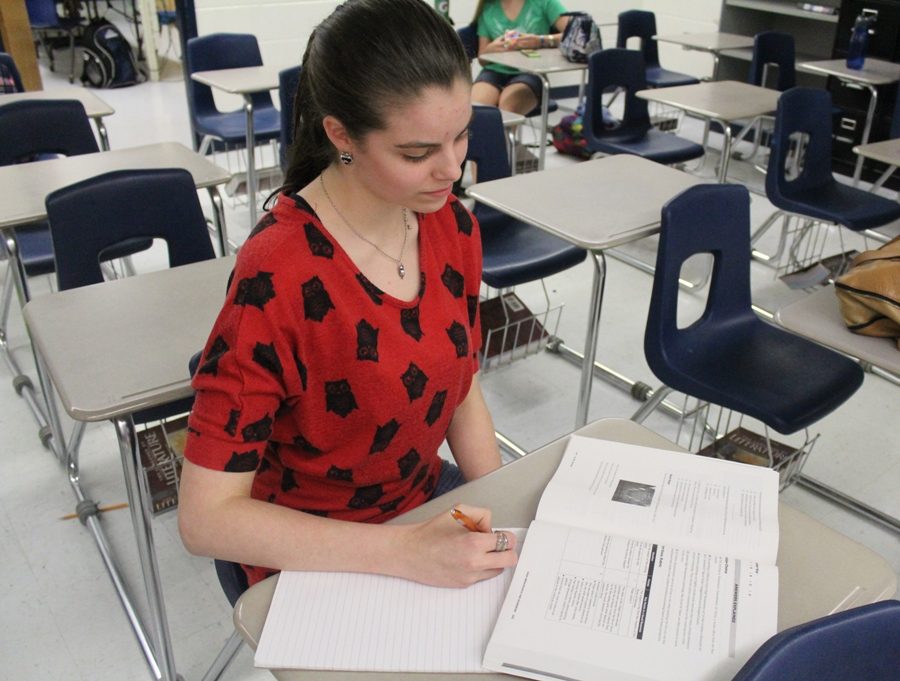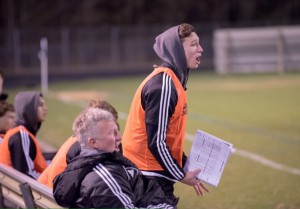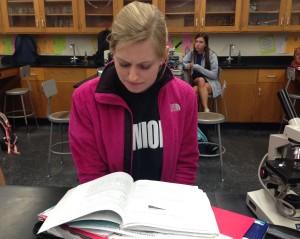Missing days, missing grades
Students with extended absences struggle to make up work
A student works on makeup work after missing many days this semester. Students who get ill or injured and miss an extended amount of days struggle with the repercussions of missing. It can affect the students understanding of a subject and can delay their learning.
May 10, 2016
Junior Caitlyn Patterson was riding back from Homecoming with a friend last October when the car hit a tree, totaling the car and breaking a vertebrae of her back in the process. She was hospitalized and missed two months of school because of the accident.
“I wasn’t in class to hear any of the class lectures about notes and what was going to be on tests,” Patterson said.
She had to make up work from all seven of her classes, but she had the help of a homebound teacher. “Physics was the hardest to catch up on because I wasn’t in class for any of the labs, notes, or lectures and my homebound teacher wasn’t used to that advanced of a class to teach, so it was very difficult,” Patterson said.
Sophomore Alivia Nace didn’t miss as much school, but she was out for a period of time because of a concussion from soccer practice in early March.
Nace agrees with Patterson that she found it challenging to get back on track with math-based classes. “The hardest classes to get back to are chemistry and math,” Nace said. “They are awful because you need to know formulas.”
Sophomore Kate Hopkins said her make-up work from last semester flowed into this semester. She missed nearly four months of school because of mono.
“During that time my grades fell dramatically, and once I got back to school, the workload was overwhelming,” Hopkins said. She’s had to stay before and after school until to make up tests and lessons.
This make-up work sometimes hinders learning new material, and these gaps in a student’s education can be confusing. “I feel like I’m still behind because of the amount I missed first semester carries on to this semester,” Patterson said.
U.S. history teacher Susan King cited her class as one that is especially hard to miss certain lessons. “For example, if we are studying the Great Depression in U.S. History,” King said, “you can’t really understand the significance of that unless you look at the 1920s before it– if you were out for the 20s lessons then you have to learn both at the same time and it is harder to get the cause and effect concept.”
Junior Paxton Hayes is one of her students and has to face this problem because of her weak immune system and chronic migraines. Hayes missed 45 days in 8th grade, 20 freshmen year, was homebound second semester of sophomore year, and missed 15 days this year.
Despite this, she has managed to keep a 4.0 average. “It is a lot harder, but I’m fortunate because I enjoy the challenge of the [Advanced Placement] classes so I enjoy doing the work,” Hayes said.
A few weeks before her own three AP exams, senior Pamela Jew missed 15 days and over a week straight of school. She attributes her ability to keep up her grades with her teachers.
“Teachers give me plenty of time to make up the work without being rushed,” Jew said. “When I miss a week’s worth of work, it only takes me about a week to make it up.”
Many students cite teachers and counselors as vital tools to helping their academic recovery after they physically recover from their illnesses. “Thanks to the help of Dr. Sue Hutton and my teachers, I am caught up,” Hopkins said.







